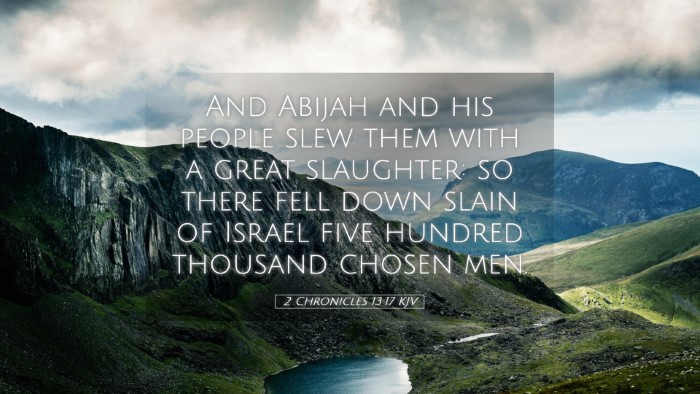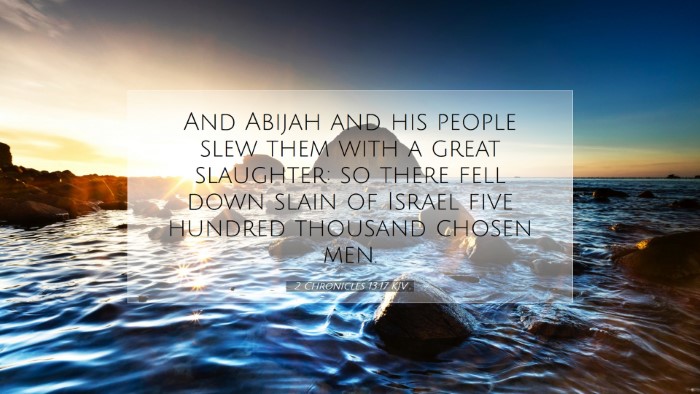Commentary on 2 Chronicles 13:17
“And Abijah and his people slew them with a great slaughter: so there fell down slain of Israel five hundred thousand chosen men.” - 2 Chronicles 13:17
Introduction
This verse encapsulates a significant moment in the tumultuous history of the divided kingdom of Israel and Judah. It recounts the victory of Abijah, King of Judah, over the Israelites led by Jeroboam. This narrative serves not only as a historical account but also as a lesson in the sovereignty of God, the importance of fidelity to divine principles, and the consequences of rebellion against God’s chosen leaders.
Historical Context
The events leading up to this confrontation are essential for a clear understanding of the narrative. After the division of the kingdom, Jeroboam established his rule over the ten tribes of Israel. He sought to alter religious worship by setting up golden calves in Bethel and Dan, attempting to divert the people's loyalty away from Jerusalem and the Temple of God. In contrast, Abijah, though not a perfect king, attempted to uphold the principles of the Davidic line and the worship of the true God.
Abijah's Leadership
Matthew Henry emphasizes that Abijah’s reign is marked by a certain level of fidelity to God's commandments, particularly in maintaining the worship in the Temple, especially in contrast to Jeroboam's idolatrous practices. This commitment is critical in the ensuing battle, as it demonstrates that Abijah rallies his forces with divine support.
Jeroboam's Rebellion
Albert Barnes notes that Jeroboam's actions were not merely political but deeply spiritual in nature. His rebellion against the House of David was an affront to God, and as a result, he faced divine disfavor. Thus, when Abijah confronted Jeroboam, it was not merely a matter of military prowess but also a demonstration of God’s judgment against Jeroboam's idolatry.
The Battle and Its Significance
The battle described in this verse is characterized by a stark contrast between the might of the armies and the underlying spiritual reality.
Divine Intervention
The “great slaughter” of Israelite soldiers serves as an indication of God’s intervention. Abijah's victory (which claimed 500,000 chosen men of Israel) is interpreted by many commentators as a result of divine support. Adam Clarke elucidates that despite their numerical disadvantage, the allegiance of Abijah to God was crucial. This highlights the biblical principle that obedience to God can lead to miraculous victories, regardless of outward circumstances.
Lessons from the Battle
- God’s Sovereignty: The outcome of this battle reassures believers of God's ultimate authority over nations and leaders. It demonstrates that God can give victory to those who are faithful to Him, regardless of their apparent weaknesses.
- The Importance of Faithfulness: Abijah’s faithfulness and the call to repentance for Israel resonate throughout Scripture. Spiritual fidelity, as illustrated, results in divine favor, while rebellion leads to devastating consequences.
- Judgment Against Idolatry: The defeat of the idol-worshipping Israelites serves as a broader warning against the encroachment of idolatry within God’s people. It is a reminder that God despises divisions that lead His people away from true worship.
Theological Implications
This passage invites deep theological reflection on several levels. It raises questions about the nature of leadership, the role of God in national conflicts, and the interpretation of God's justice.
Leadership in Scripture
Matthew Henry argues that the character of a leader profoundly affects the moral and spiritual direction of the people. Abijah, as a descendant of David, is seen as a divinely appointed leader, whereas Jeroboam’s rise signifies a rejection of God’s authority. This has implications for modern church leadership, where adherence to divine principles is paramount.
God’s Justice and Mercy
Albert Barnes articulates that while God’s judgment is evident in the defeat of Jeroboam’s forces, it is also indicative of God's mercy towards those who remain faithful. The slaughter is a stark reminder of the consequences of sin, yet it also emphasizes the hope for repentance and restored relationship with God.
Conclusion
2 Chronicles 13:17 encapsulates profound truths about God’s sovereignty, judgment, and the importance of fidelity to His ways. For pastors, theologians, and students of Scripture, this verse serves as a powerful reminder of the convictions that shape both individual lives and collective communities. It insists on the need for faithful leadership and warns against the spiritual dangers of idolatry, urging a return to earnest devotion to God.
As such, may this account challenge and encourage believers to uphold the standards of God’s kingdom and faithfully confront the adversities of their time, reflective of the boldness that characterized Abijah’s reign.


